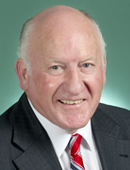The drive from Melbourne to Swan Hill is quite long, 350km in fact. So I had plenty of time to ponder the fact that I am just an emerging journalist who has no real idea of how to interview politicians. But I needn’t of worried. ‘You must be tired after the long drive. Would you like a cuppa?’ The friendly face of John Forrest aksed, as I walked into his office. And I was immediately at ease.
John Alexander Forrest, affectionately dubbed ‘Mr Pipeline’ by his colleagues, is the federal MP for the largest geographical electorate in Victoria. The seat of

Mallee is about the size of Scotland and covers over 30 per cent of Victoria.
Forrest knows this northwest corner of Victoria well, having been born and raised in the Mallee town of Red Cliffs in the 50s. And from a very young age he had grand plans for the region.
Forrest recalls telling his dad about his ambitions at the age of six: ‘Grandpa always talks about building a bridge over the English channel and you’re always talking about piping the Mallee, so to do these I’ve got to be an engineer.’
Forrest followed through on his childhood goals and became a civil engineer. And when he entered parliament in 1993, it was on the back of an engineering promise. Forrest’s election platform was to build the largest rural water infrastructure network in Australia – Wimmera-Mallee pipeline.
Before 1993 Forrest had a private practice in Swan Hill as a consulting engineer, specialising in irrigation development, subdivision and structural design. He was also part of the city council and local water boards when the Country Party (now Nationals) approached him to stand for parliament. They hoped that he could deliver the pipeline, an idea that was more than a century old.
Running approximately 9000 kms, the Wimmera-Mallee pipeline was finally completed in 2010, replacing 16,000 kms of highly inefficient open channels. The new pipeline is claimed to save enough water to fill Olympic sized swimming pools placed end to end from Melbourne to Darwin each year. When it was completed a pump station was named in honour of Forrest.
The pipeline has been ‘signed, sealed and delivered’ reads the souvenir edition of Wimmera Mail-Times that Forrest hands to me. He is clearly proud of his achievement but says he never thought that it would be him that would eventually steer the pipeline’s approval through parliament. And he never imagined he would serve seven consecutive terms.
‘I thought of doing just a couple of terms to get this done. But it took longer than I thought because you’ve got to be able to sway the room, convince other people who have different priorities, that this is a worthy thing to do,’ says Forrest.
Forrest seems to carry out work not only with determination but with his own personal value system as well. In a room filled with framed recognitions and inspirational quotes, I read one out aloud: ’God put me on this earth to accomplish a certain number of things. Right now, I am so far behind, I shall never die.’ He interrupts me half way and says: ‘I got to tell you a story.’
As a 16-year-old Forrest came home one night a little inebriated. His mother was already concerned that he was leaning towards atheism and coming home drunk didn’t help. So his dad asked him to join him under the walnut tree in their backyard.
‘Now son, this thing with the alcohol, I’m not worried about that ’cos you’ll figure that out by yourself. But this atheist business, what’s that about?’ Forrest remembers his dad saying. ‘I dunno dad. I can’t seem to make it fit. It doesn’t make a lot of sense to me,’ replied Forrest.
His dad, who served in the Second World War, then said to him: ‘If you are ever under an artillery bombardment, and all of a sudden one of those shells come and land in the trench with you, and all that’s left of your mates is battered over you…If that ever happens to you son, then you will pray’.
I notice goose bumps on Forrest’s arms. ‘I heard the best sermon of my life at 16,’ says Forrest. And that moment has had a lasting impact on him.
He glances across the desk to 18 inches of stacked paper. ‘There are some terribly nasty letters in there,’ says Forrest. ‘But my value system drives me in this job and gives me the basis upon which I don’t have to react to nasty things said about me because I know in my heart of hearts that I’m a better person than that. And I’m not lazy or indifferent.’
Forrest’s value system has compelled him to reach out beyond his community and help those less fortunate. He commenced water projects in Sudan and Thailand. He also worked with ‘Hope for Hopeless’, an organisation that rescues children from sex slavery in Thailand.
An hour had quickly gone by and I had somehow muddled my way through my first political interview. ‘You lot are the future,’ said Forrest as he walked me out. ‘You can make up for what we couldn’t achieve.’
Athira Crispin is a student at La Trobe University.
To view profiles of some of the other backbenchers as part of upstart’s Backbench Insiders project, click here.






